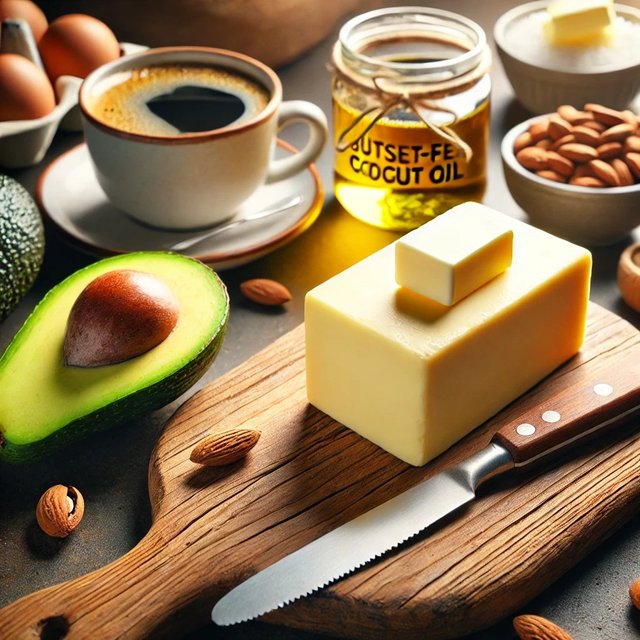
Is Butter Keto?
Yes, butter is keto-friendly. It fits well with the ketogenic (keto) diet, which is a high-fat, low-carb eating plan that requires careful food selection to maintain ketosis. Ketosis is a metabolic state in which the body burns fat for fuel instead of carbohydrates.
Nutritional Profile of Butter
Butter is primarily composed of fat. A single tablespoon (14 grams) of butter provides:
- Calories: 102
- Fat: 11.5 grams
- Protein: 0.1 grams
- Carbohydrates: 0.1 grams
- Fiber: 0 grams
- Sugar: 0.1 grams
This high-fat, low-carb composition makes butter a suitable addition to a ketogenic diet, helping meet the diet's macronutrient goals.
Benefits of Butter on a Keto Diet
- High in Healthy Fats: Butter is rich in saturated and unsaturated fats, essential for maintaining energy levels and supporting various bodily functions on a keto diet. These fats help keep you satiated, reducing the likelihood of overeating.
- Vitamins and Minerals: Butter contains vitamins A, D, E, and K, which are fat-soluble and essential for various bodily functions, including vision, bone health, immune function, and antioxidant protection.
- Support for Ketosis: Due to its high-fat and low-carb profile, butter supports ketosis, allowing the body to burn fat more efficiently.
How Much Butter is OK on Keto?
While butter is beneficial on a keto diet, moderation is key. The general recommendation is to consume 70-80% of your daily calorie intake from fats. One tablespoon of butter contains approximately 11.5 grams of fat, so it can be incorporated into meals but should be balanced with other fat sources to avoid excessive calorie intake.
Best Types of Butter for Keto
- Grass-Fed Butter: Rich in omega-3 fatty acids and has a better nutrient profile than conventional butter.
- Organic Butter: Free from pesticides and antibiotics, providing a cleaner fat source.
Uses of Butter in a Keto Diet
- Cooking: Ideal for sautéing, frying, and roasting due to its high smoke point.
- Baking: Essential for keto-friendly baked goods, adding moisture and richness.
- Bulletproof Coffee: A popular keto breakfast beverage combining coffee, MCT oil, and grass-fed butter to boost ketone production.
- Spreads: Use on keto-friendly bread like almond flour or coconut flour bread for a satisfying snack.
Salted vs. Unsalted Butter
- Salted Butter: Contains added salt, which can enhance flavor but may lead to water retention and bloating if consumed excessively.
- Unsalted Butter: Allows for better control over sodium intake and seasoning, making it a versatile option for cooking and baking.
Butter vs. Other Fats
Comparing butter to other fats can help diversify your keto diet:
- Olive Oil: High in monounsaturated fats and antioxidants, ideal for low-temperature cooking and salads.
- Coconut Oil: Rich in medium-chain triglycerides (MCTs), which boost ketone production and provide a quick energy source.
Potential Drawbacks of Butter on Keto
- Lactose Intolerance: Butter contains lactose, which can cause digestive issues for those with lactose intolerance.
- Caloric Density: High in calories, excessive butter consumption can lead to weight gain if not balanced with overall caloric intake.
- Allergies: Some individuals may have sensitivities to dairy proteins, resulting in allergic reactions.
Keto-Friendly Butter Substitutes
For those who need alternatives to butter, several options fit nicely within a keto diet:
- Ghee: Clarified butter with the milk solids removed, offering a rich, nutty flavor and higher smoke point.
- Coconut Oil: A versatile substitute, especially for baking, providing MCTs that enhance ketosis.
- Avocado: High in healthy fats and nutrients, suitable for recipes requiring a creamy texture.
Conclusion
Butter can be a valuable addition to a ketogenic diet due to its high-fat, low-carb content and rich nutrient profile. However, it is crucial to consume it in moderation and opt for high-quality butter, such as grass-fed or organic varieties. Explore substitutes like ghee, coconut oil, or avocado to diversify your fat sources and maintain a balanced keto diet. By understanding the role of butter and making informed choices, you can enjoy its benefits while staying on track with your ketogenic goals.
FAQ
Is peanut butter keto?
Yes, peanut butter can be keto-friendly if it's natural and free of added sugars and hydrogenated oils. Opt for peanut butter with minimal ingredients.
Is almond butter keto?
Yes, almond butter is keto-friendly. It is a good source of healthy fats and low in carbohydrates, making it suitable for a ketogenic diet.
For more information on butter and other keto-friendly spreads, visit Cast Iron Keto.